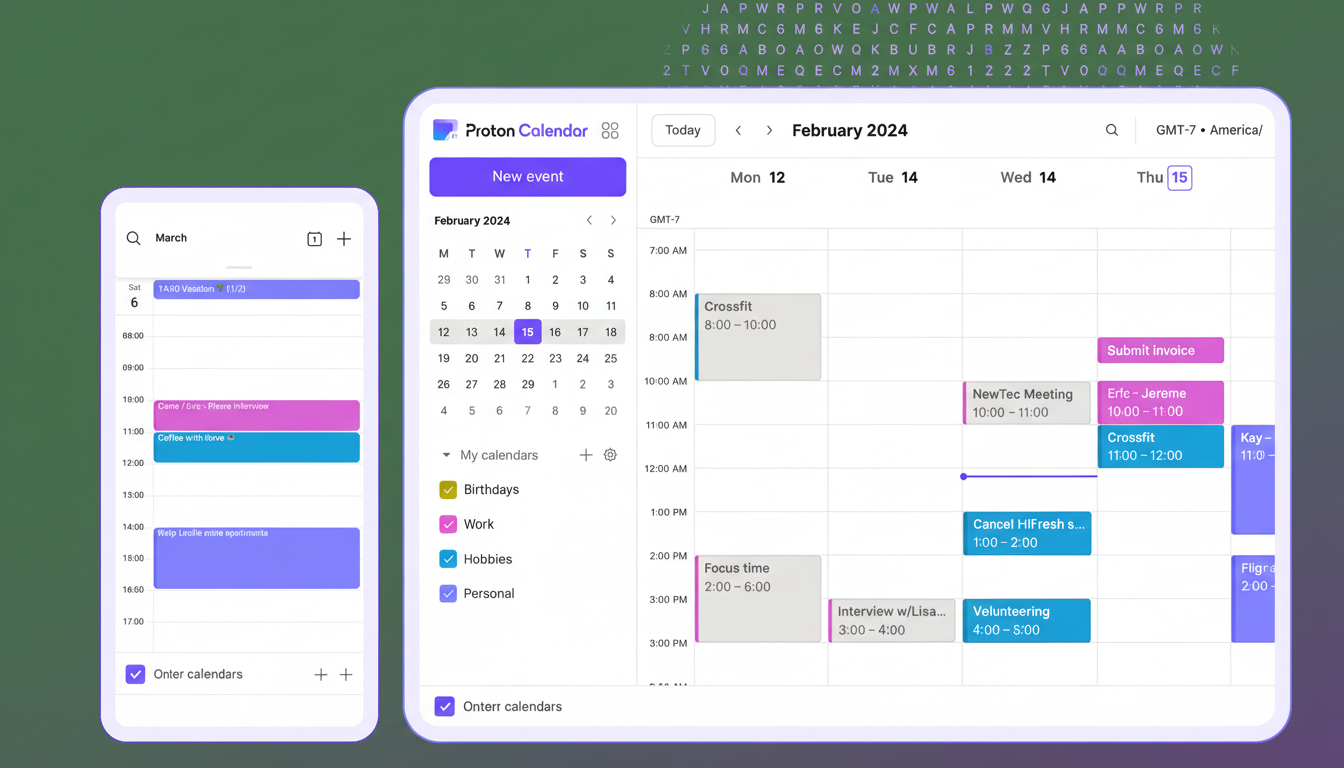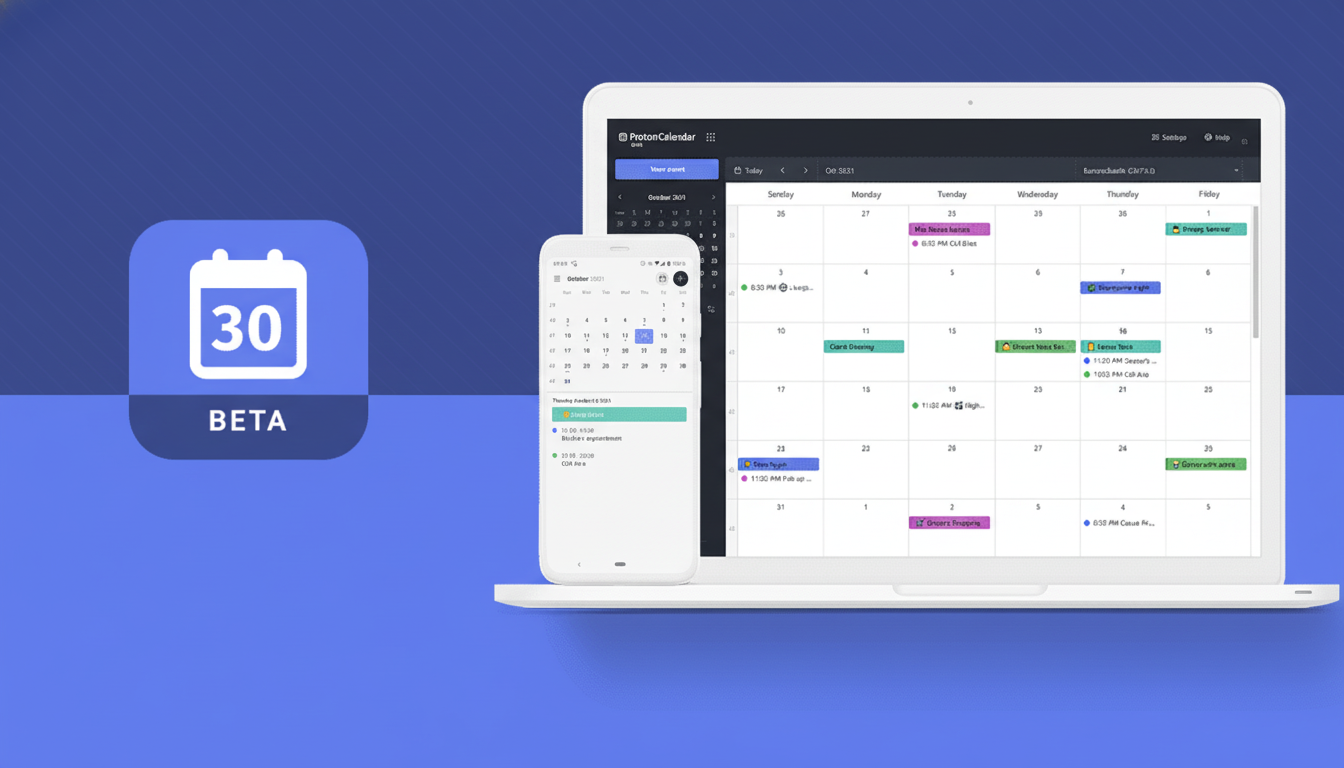“If you’re weighing a move away from Google Calendar, you’re not alone. Power users increasingly want richer privacy controls, faster event entry, and deeper task or database integrations than Google’s minimalist app offers on Android. After testing dozens of options, these five apps stand out right now for different reasons—privacy, productivity, or pure power features—without forcing you to rethink your entire workflow.”
Our picks emphasize security, multi–time zone support, smart scheduling, and ease of migration from Google or Microsoft accounts. Where relevant, we note pricing, standout features, and real-world trade-offs to help you choose with confidence.

Proton Calendar
“For privacy-first users, Proton Calendar is the clear frontrunner. Built by the Switzerland-based team behind Proton Mail, it offers end-to-end encryption for event titles, descriptions, locations, and participants, with zero-access architecture so the provider can’t read your data. That approach aligns with stringent Swiss data protection rules and GDPR expectations, a point privacy advocates like the Electronic Frontier Foundation consistently underline when discussing metadata and calendar security. The interface is clean with just enough personality to feel modern, and it syncs seamlessly with Proton Mail and Proton Drive. The trade-off is limited third-party integrations by design.”
The free tier supports up to three calendars; paid plans raise that limit to 25 calendars and unlock sharing, starting at $9.99 per month.
If you’re more concerned with safeguarding sensitive schedules than deep app ecosystems, the safest bet is Proton Calendar.
Notion Calendar
Originally named Cron, the app has been rebranded as Notion Calendar. The app is a sure hit for people who manage their projects in Notion. The most significant benefit is that it integrates with Notion databases in both directions: you can launch, modify, and manage dashboards or jobs right from the calendar, and the integration keeps everything synchronized without a long context switch. The app also allows for scheduling connections to external meetings, mapping schedules on the basis of the function key, and quick pop-up windows on your laptop that let you hop on a call.
It can operate with Google and Microsoft accounts, manage numerous time zones without any hitches, and, most importantly, it’s completely free. Non-Notion users will still get a well-developed calendar that is simple and quick. However, the calendar’s real power is in the database sync: it turns events into digital work items.
Any.do
It’s a calendar–to-do list hybrid that works well if you want things to be combined into one view. It’s a planner. Although the product is primarily a to-do list, it assembles your Google Calendar in addition to Microsoft’s or Apple’s, and then you can see your daily tasks and meetings in one place. It’s an excellent time saver for freelancers and small firms.

The free edition is available, and for $4.99 per month, a premium plan lets you obtain color stickers, recurrent assignments, and customizable themes. In long-term trials, the visual appeal of simple and well-organized preparation has helped us keep our responsibilities more manageable and realistic.
Business Calendar 2
Don’t be fooled by the no-nonsense look—Business Calendar 2 is an Android powerhouse for users who want control. The app offers multiple view options, a dedicated Birthday view, a capable Tasks section, and a floating action button that you can customize to show the actions you use most. The power toggles at the bottom let you show or hide specific calendars with a tap, which is handy for people who switch between their clients’ and personal schedules. The free version is more than adequate, while the premium version offers more than 20 themes, weather in selected views, and file attachments to events, to name but a few extras. A subscription costs $0.99 per month, which is good value for keen planners.
One Calendar
If you want one pane of glass for everything, One Calendar is that pane. It aggregates your Google, Microsoft 365/Outlook, iCloud, Exchange, and CalDAV accounts into a single, consistent UI. For people who split their work and personal accounts across all sorts of providers yet hate hopping between apps, the features will appeal. Tasks require the companion app, but once added, they appear right inside your calendar views. You get custom theming and a simple, ad-free experience in the free tier, too.
For most users, the biggest win is the process of connect/consolidate/carry on.
Google Calendar remains a rock-solid default, especially if you live in Gmail, Drive, and Meet. But here’s where demanding users face the gaps: Natural language event entry on Android will still pale compared to specialized tools. Privacy controls won’t achieve true end-to-end encryption. Task integration will stay rudimentary until you use several Google apps stacked together. Scheduling links and a unified task timeline will save you real time every week when organizing a hybrid team across time zones, assuming you’re willing to use them.
How to choose the right calendar alternative for you
- Choose Proton Calendar if privacy is non-negotiable.
- Choose Notion Calendar if your life is already in Notion and you need a database behind your schedule.
- Get Any.do if uniting tasks and events is your only criterion.
- Get Business Calendar 2 to dive into customization and high-end controls on Android.
- Get One Calendar if you want to pull several providers into a calm interface.
Whichever you choose, set it up to receive ICS exports of your existing calendars, import them, and run the new app exclusively as a test for a full week. The best calendar isn’t the one with the most extensive feature list—it’s what makes you show up.

